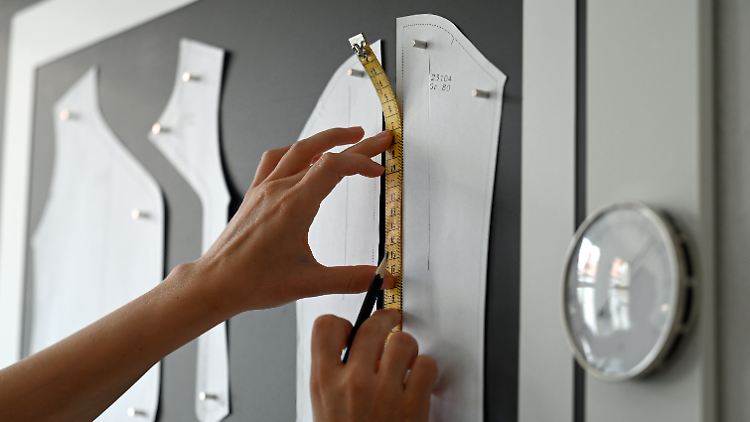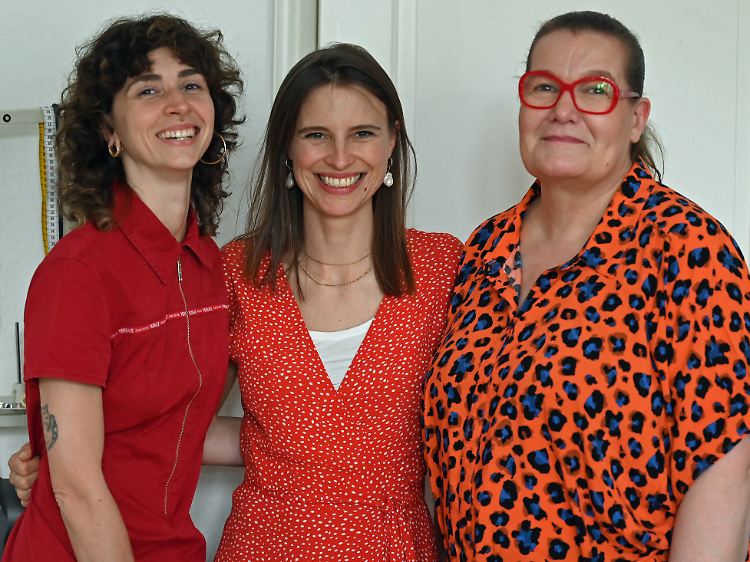obstacles and prejudices
It is not only the search for investors that is more difficult for female founders
7/2/2023 1:36 p.m
The start-up industry is still a male-dominated scene: in the past year, only about every fifth company was founded by women. The reason: They have to contend with completely different challenges than their male colleagues.
Green pieces of paper are stuck to various parts of the body of a child’s doll. There is tinkering, discussing, handicrafts. Several designers are working together to think about how they can sew enough openings and fasteners into children’s clothing such as jackets or bodies so that nothing gets stuck, but everything is still well protected. “It is important for clothing to have many openings for medical access, but also that you can change clothes quickly,” says Jana Walther.
Lena Förster (l), Lina Phyllis Falkner (m), Jana Walther (r) founded the Berlin company Wombly together.
(Photo: picture alliance/dpa)
She is co-founder of the startup Wombly, which designs and sells clothing for children with disabilities and chronic illnesses. Of the nine employees, three are men. But the company was founded in 2020 by an all-women team. In addition to Walther, these include Lena Förster and Lina Phyllis Falkner. In a start-up industry that is still heavily male-dominated, her company is an exception.
According to the “Female Founders Monitor” of the Federal Association of German Startups, only around every fifth startup was founded by women last year. They were also more likely to be represented in the health, nutrition, education and textiles sectors. This makes Wombly a typically female startup, despite the mixed team. “It always annoys me a bit,” says Falkner. “We have also been told that, according to a study, women are more social and should therefore prefer to work in social professions.” Such condescending comments are rare. However, she often has the impression that she is not being taken seriously or is being smiled at, she says.
Unconscious tendency to prefer men
Other founders report similar experiences. “I was recently at a trade fair with one of my male freelancers. Sometimes the men there only spoke to him, although I am the founder and started the conversations,” says Julia Ezinger. Your Stuttgart startup Rhome advises employers on legal issues if their employees want to work abroad. Female founders already have a harder time finding investors.

The company produces clothing for children with disabilities and chronic diseases.
(Photo: picture alliance/dpa)
“There is this unconscious bias that investors tend to ask women questions about risk and men more questions about opportunities,” says Hanna Asmussen from the Hamburg startup Localyze, which wants to make it easier for companies to bring employees from abroad or send them there. In a 2017 Harvard study, the authors found that there is an “unconscious bias” among male and female investors, i.e. an unconscious tendency to prefer men. Not only were they asked more often about the potential of their business idea, they also received seven times as much funding on average, around $14 million more.
In so-called impact startups, i.e. those that have a social or ecological orientation, it is often not about profit maximization – unlike in the male-dominated startup sectors, says Wombly founder Falkner. “But the people who give the money are simply very profit-oriented. Purely female founding teams are also viewed more skeptically.” Nevertheless, the founders found an investor after a grant and a crowdfunding campaign.
Women often do unpaid care work
However, the challenges for women in the startup sector do not end with the search for investors. “I know stories in which female founders say they didn’t get the investment because they were pregnant,” says Franziska Teubert, managing director of the startup association. Many women did not dare to address the issue openly – for fear of being disadvantaged. “Statistically, starting a family and founding a startup fall into the same phase of life,” says Teubert. But even later in their careers, women often take on unpaid care work, such as raising children, which leaves them less time for work.
According to studies, the weekly working time of women with children decreases by several hours on average, while it usually remains almost the same for men. “As a woman, I’m constantly asked if I want to have children or if I want to combine a job and children. As a man, you’re asked less often,” says Localyze founder Asmussen. According to Teubert, female founders do not have the same entitlement to maternity benefit as self-employed people, and getting support in this area is often complicated and hardly worthwhile, as it is with supplementary insurance. “You get 13 euros a day while the costs continue,” says the head of the association. “If you don’t have any savings, it doesn’t help you that much.” She calls for better insurance protection for the self-employed. Health insurance companies could, for example, bear the employee’s share in the event of illness, and a state fund for the 14 weeks of maternity leave could also help. “The women also take on a social task by having children,” says Teubert. For them, a lot still has to happen in this area in order to balance the gender ratio.
